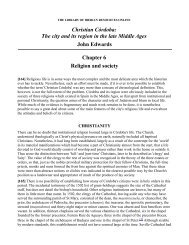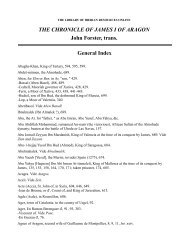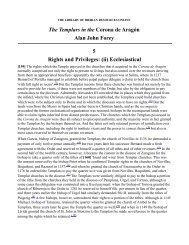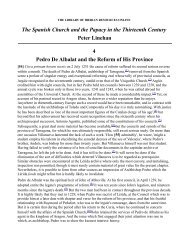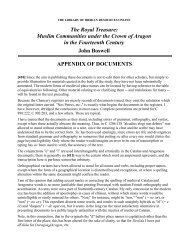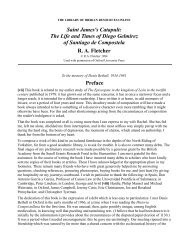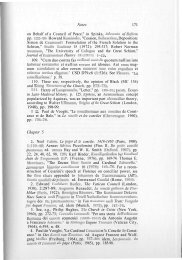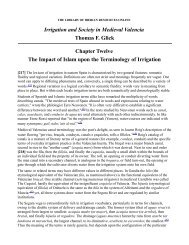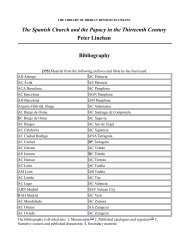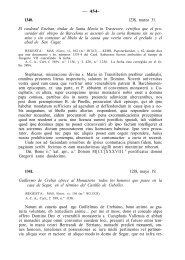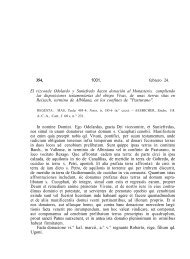PROTESTANTISM - The Library of Iberian Resources Online
PROTESTANTISM - The Library of Iberian Resources Online
PROTESTANTISM - The Library of Iberian Resources Online
Create successful ePaper yourself
Turn your PDF publications into a flip-book with our unique Google optimized e-Paper software.
Q. Have those who established themselves in Spain, in virtue <strong>of</strong> the royal order <strong>of</strong> 1791,<br />
complied with the formalities which it prescribes?<br />
A. As no advice has been sent to this tribunal by the Junta del Comercio y Moneda, nor by the<br />
Intendente <strong>of</strong> the kingdom, it is inferred that no non-Catholic artists have established<br />
themselves, or else that the prescription to advise the tribunal has not been obeyed.<br />
Q. Whether they (non-Catholic foreigners) contract marriage with Catholics and, in that case,<br />
what is the religion <strong>of</strong> the children?<br />
[474] A. But one case <strong>of</strong> such marriage is known--that <strong>of</strong> Juan Foch, a German <strong>of</strong> Lindau, who<br />
called himself a travelling merchant, with Bernarda María Pellicer <strong>of</strong> this city. This was in<br />
virtue <strong>of</strong> a papal brief, passed by the Council <strong>of</strong> Castile and with the royal exequatur, providing<br />
that he should allow his wife to remain a Catholic and his children to be brought up in the same<br />
faith, and she promising to persuade him to conversion. <strong>The</strong>y were married privately, outside <strong>of</strong><br />
the church and without banns or other public ceremonies. We learn from the Vicar <strong>of</strong> Los Santos<br />
Juanes, where they live, that they cause no scandal, comply with the obligations and that a boy<br />
has been baptized.<br />
Q. Since the royal order, about how many non-Catholic strangers have established themselves,<br />
naming some <strong>of</strong> the principal ones and their nation or sect?<br />
A. This could be answered only by examining the registers required to be kept by the captaingeneral<br />
and royal justicias. This tribunal can only have notice by denunciations, which has<br />
occurred only with Foch.<br />
Q. How many autillos públicos have been held with strangers since 1759 when Carlos III<br />
ascended the throne? State the name, country, religion and principal <strong>of</strong>fences.<br />
A. Since 1759 there has been no autillo público for strangers. (153)<br />
This document has interest not only as showing the continued vigilance as to foreign heretics, but as<br />
indicating how thoroughly successful had been the policy <strong>of</strong> exclusion. <strong>The</strong> district <strong>of</strong> the tribunal<br />
embraced a long stretch <strong>of</strong> sea-coast, including such commercial cities as Valencia and Alicante, yet the<br />
non-Catholic stranger was still almost unknown, as he had been when the report <strong>of</strong> 1785 was made.<br />
Spain was a land to be shunned by all who were liable to be dealt with by the Inquisition, and it was<br />
left to its isolation. For those who ventured it, concealment <strong>of</strong> heresy was worse than its avowal. David<br />
Bonoran, a French Protestant, domiciled in Bilbao, succeeded in passing as a good Catholic. Becoming<br />
converted, he applied to the tribunal <strong>of</strong> Logroño to abjure his errors and be incorporated in the Church,<br />
when, in 1791, he was promptly prosecuted for having feigned Catholicism. (154)<br />
This sensitiveness survived the Peninsular War and was vigorous to the last. In 1816 there is<br />
considerable correspondence respecting the wife <strong>of</strong> Don Rufino de Acha, settled in Bilbao as a<br />
merchant, who had married in England a Protestant named Doña Juana de Ancell--presumably Jane<br />
Hansell. From this it appears that, after a discussion lasting nearly a year, she was given the alternative<br />
<strong>of</strong> leaving Spain or <strong>of</strong> conversion and that she accepted the latter. (155)<br />
[475] This persistent dread <strong>of</strong> heretics is vividly reflected in one <strong>of</strong> the last acts <strong>of</strong> the Suprema prior to<br />
its suppression. In 1819 it issued an elaborate series <strong>of</strong> instructions for the guidance <strong>of</strong> commissioners<br />
at the sea-ports in the visitas de navios, or examination <strong>of</strong> all ships on their arrival. This was principally<br />
intended to prevent the introduction <strong>of</strong> prohibited books, which will be considered hereafter, but the<br />
sections devoted to heretics show that the regulations adopted at the treaty <strong>of</strong> 1605 were still in force.<br />
Foreign heretics were not to be prosecuted for acts committed abroad but, for anything done in Spain



